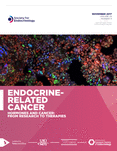Anti-Müllerian hormone: determination of ovarian reserve in early breast cancer patients
- Claudia Bozza1,
- Fabio Puglisi1,2,
- Matteo Lambertini3⇑,
- Etin-Osa Osa4,
- Massimo Manno5 and
- Lucia Del Mastro6
- 1Department of Oncology, University Hospital of Udine, Udine, Italy
2Department of Medical and Biological Sciences, University of Udine, Udine, Italy
3Department of Medical Oncology (UO Oncologia Medica A), IRCCS AOU San Martino-IST, Largo Rosanna Benzi, 10, 16132 Genova, Italy
4Department of Radiation Oncology, New York University School of Medicine, New York, New York, USA
5Mother and Child Department, Pordenone Hospital, Pordenone, Italy
6Department of Medical Oncology (SS Sviluppo Terapie Innovative), IRCCS AOU San Martino-IST, Genova, Italy
- Correspondence should be addressed to M Lambertini; Email: matteo.lambertini{at}hsanmartino.it
Abstract
Breast cancer is the most common invasive cancer in women of reproductive age. In young women, chemotherapy may induce amenorrhea: it is still uncertain how to assess menopausal status in these patients despite the importance of its definition for choosing appropriate endocrine treatment. In the development of sensitive biomarkers for fertility and ovarian reserve, anti-Müllerian hormone (AMH) is considered a promising marker of ovarian reserve. The clearest data regarding a clinical use of AMH are related to the measurement of the ovarian pool in women who undergo IVF: the available data, also in breast cancer patients, seem to suggest that AMH measurement, before gonadotropin administration, can be a useful marker for the prediction of women at risk for poor-response or no response to ovarian stimulation. The utility of AMH as a potential marker of chemotherapy-induced ovarian follicular depletion and an early plasma marker of chemotherapy-induced gonadal damage has been evaluated both in young women after treatment for cancer in childhood and in young survivors of hematological malignancies and solid tumors. Several studies have demonstrated a potential utility of AMH, inhibin, or follicle-stimulating factor as biomarkers predicting infertility risk in breast cancer patients, but the studies conducted so far are not conclusive. Further studies are needed in order to define the regimen-specific action of chemotherapy on AMH levels, the percentage of post-treatment recovery of plasma levels of the hormone, and the relationship between menopausal status and AMH.
- Revision received 17 October 2013
- Accepted 28 November 2013
- Made available online as an Accepted Preprint 29 November 2013
- © 2014 Society for Endocrinology












